Réseautage dans le secteur scientifique.
Results
Publication in the edited volume published by the Swiss Academies of Arts and Sciences on the topic COVID-19 - Science and Society
Kessler, S. H., Jobin, A., Grüninger, S., & Georgi, F. (2021), Was können wir aus Covid-19 Fake News über die Verbreitung von Fehlinformationen im Allgemeinen lernen? Ein Projekt der Swiss Young Academy. Swiss Academies Communications, 16(5), 68-75.
Read here: https://api.swiss-academies.ch/site/assets/files/37164/studien_covid_19_2_auflage.pdf
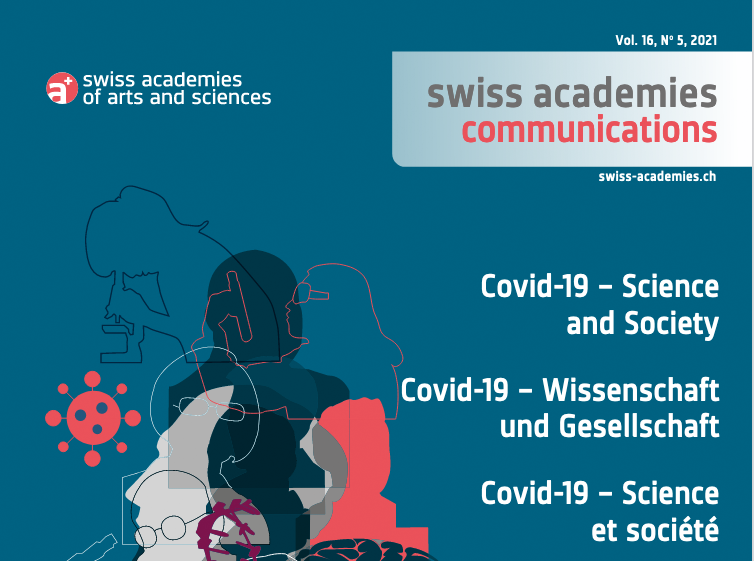
Workshop on "COVID-19 Fake News: Co-Creation-Analysis of a Switzerland-wide Survey"
16th September 2021, 11:15-12:45 at the University Fribourg
This workshop took place within the context of last year's ScienceComm'21, which is themed “Science Communication in a Period of Crisis”
Workshop description:
The emergence of the novel coronavirus (SARS-CoV-2) stirred severe insecurity among the public, which allowed misinformation hereon to spread rapidly. As part of an interdisciplinary project of the Swiss Young Academy, over 1,000 individuals living in Switzerland were interviewed in April 2021 on their experience with science communication during the corona pandemic.
Together with the workshop participants, the open interview questions addressing the role of politics, research and media, as well as persisting uncertainties of the representative survey were analysed and typecasted. Based on the results of the workshop as well as the answers from the questions addressing sources of information and trust, a follow-up project will develop strategies for political, scientific and media actors to counteract fake news.
The participants of the co-creation workshop were invited to contribute to both the analysis as well as the interpretation of the results of the survey. The collaborative scrutinization of curious non-professionals, researchers and media professionals completes the knowledge gained from the collected data. Instead of only publishing the final results, the project aims to feed the discussions, justifications and considerations during the workshop back into the project for the benefit of the analysis. Meanwhile, the participants create an open space for interaction.
Presentation and discussion of first project findings at the European Conference on Health Communication (ECHC)
4-5 Nov. 2021 virtual; ECHC 2021 | European Conference on Health Communication 2021
Kessler, S. H., Jobin, A., & Georgi, F. (2021). An analysis of Swiss people’s subjectively perceived misinformation regarding the novel coronavirus.
Abstract:
Since the COVID-19 pandemic began, a large amount of misinformation has been disseminated worldwide. This is seen as problematic for containment, as it could discourage citizens from vaccinating, for example. It would also be problematic in Switzerland, where around a quarter of the population is skeptical about COVID-19 vaccination. However, little is known about what subjectively perceived misinformation the Swiss have encountered so far.
RQ1: What subjectively perceived misinformation regarding the novel coronavirus have Swiss people encountered so far?
RQ2: Where have Swiss people encountered this misinformation?
RQ3: To what extent is the frequency with which Swiss people have encountered misinformation related to their information behavior?
We conducted an online survey in Switzerland that is representative in terms of age, gender and education (N = 1,129; n = 741 from German-speaking Switzerland; n = 387 from French-speaking Switzerland; 52.4% female; Mage = 48; SD = 15) in April 2021 and asked openly: "What misinformation (fake news) have you already come across with regard to the novel coronavirus? And where?" A trained coder content-analyzed and thematically bundled the open answers. We measured information behavior regarding COVID-19.
Most Swiss people encountered misinformation about COVID-19, can name examples, and can identify sources. We also found correlations between the use of information on COVID-19 and the frequency of identifying misinformation. Our findings indicate that more highly educated people and those who read scientific literature for information on COVID-19 may have a higher competence in recognizing misinformation.
Article publication in European Journalism Observatory (EJO) on the topic "What makes #COVID19 graphics trustworthy for Swiss recipients & what can we advise journalists?
Kessler, S. H., Cano Pardo, M., & Grüninger, S. (2020). Statistiken schlüssig schildern: Was grafische Statistiken verständlich und vertrauenswürdig macht. In Europäisches Journalismus-Observatorium (EJO), Dortmund, March
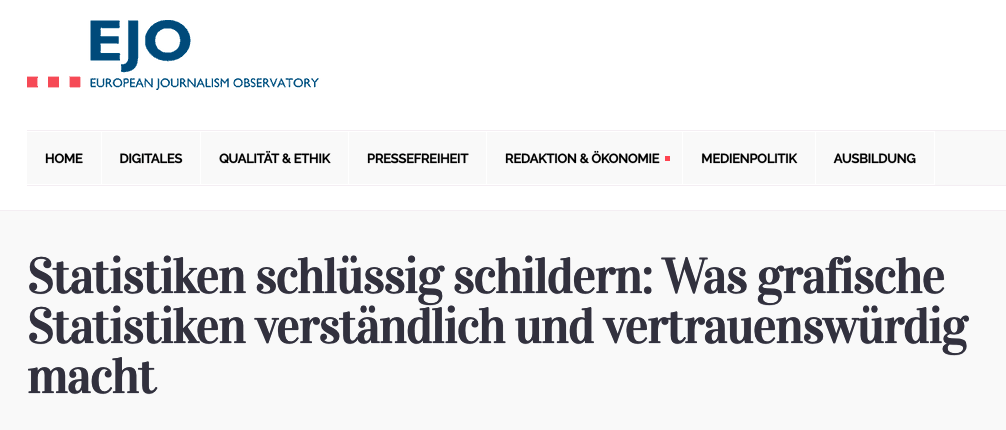
Peer-reviewed open access journal article on project findings:
Kessler, S. H., Cano Pardo, M. S., Jobin, A., & Georgi, F. (2022). How Informed are the Swiss about Covid-19 and Prevention Measures? Results of a Survey on Information Awareness, Behaviour, and Deficits. European Journal of Health Communication, 3(3), 118–142. https://doi.org/10.47368/ejhc.2022.306
Read here: https://ejhc.org/article/view/3349/2807
Abstract:
Since the coronavirus (SARS-CoV-2) pandemic began, large amounts of (mis)information have been disseminated worldwide. We conducted an online survey in Switzerland (N = 1,129) in April 2021 to ask respondents which information has received too little attention in public discourse, which measures help containing coronavirus infection and Covid-19, and about subjectively perceived Covid-19 misinformation. Content analysis of the open answers revealed that vaccination and its potential side effects, aspects related to political measures, psychological and social aspects, as well as science and research topics deserved more attention in the eyes of the respondents, mostly from politics or media. The most frequently mentioned effective measures were social distancing, wearing masks, general hygiene, and vaccination. Notably, the number of measures mentioned was related to the degree to which the pandemic affected individuals subjectively, trust in public institutions, and their individual level of science-related populism. Swiss residents with less trust in public institutions and who consume less news media on Covid-19 are more likely to believe misinformation on (in)effective measures against the virus. Most respondents encountered Covid-19 misinformation and could name examples, including sources. Education and information use affect the frequency of subjectively encountered misinformation. More highly educated people can name more misinformation instances encountered than less educated people.
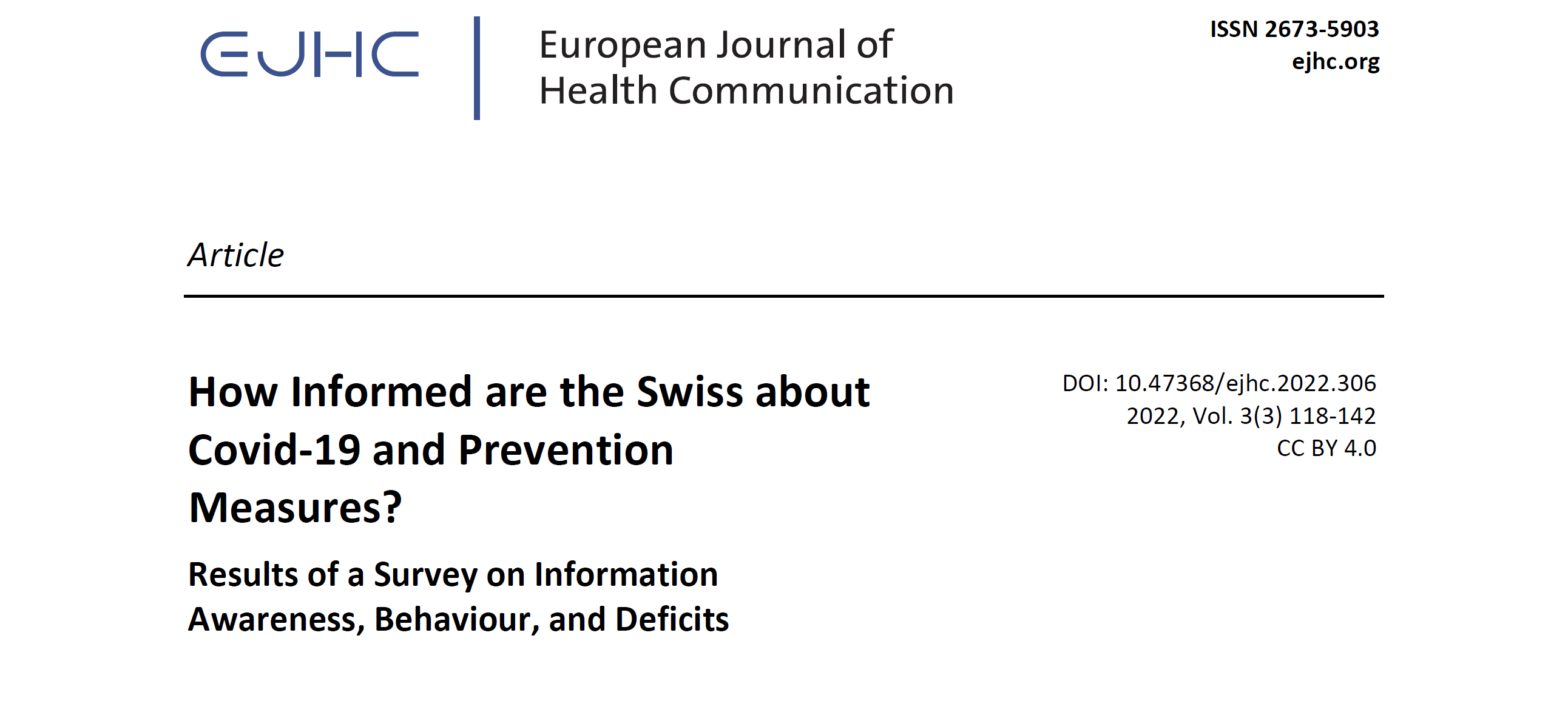
Presentation and discussion of project findings at the European Communication Conference of the European Communication Research and Education Association (ECREA)
19-22 Oct. 2022 in Aarhus (Denmark)
Kessler, S. H., Jobin, A. & Georgi, F. (2022). Informedness, Information Behaviours and Information Deficits Related to COVID-19 and Prevention Measures in Switzerland.
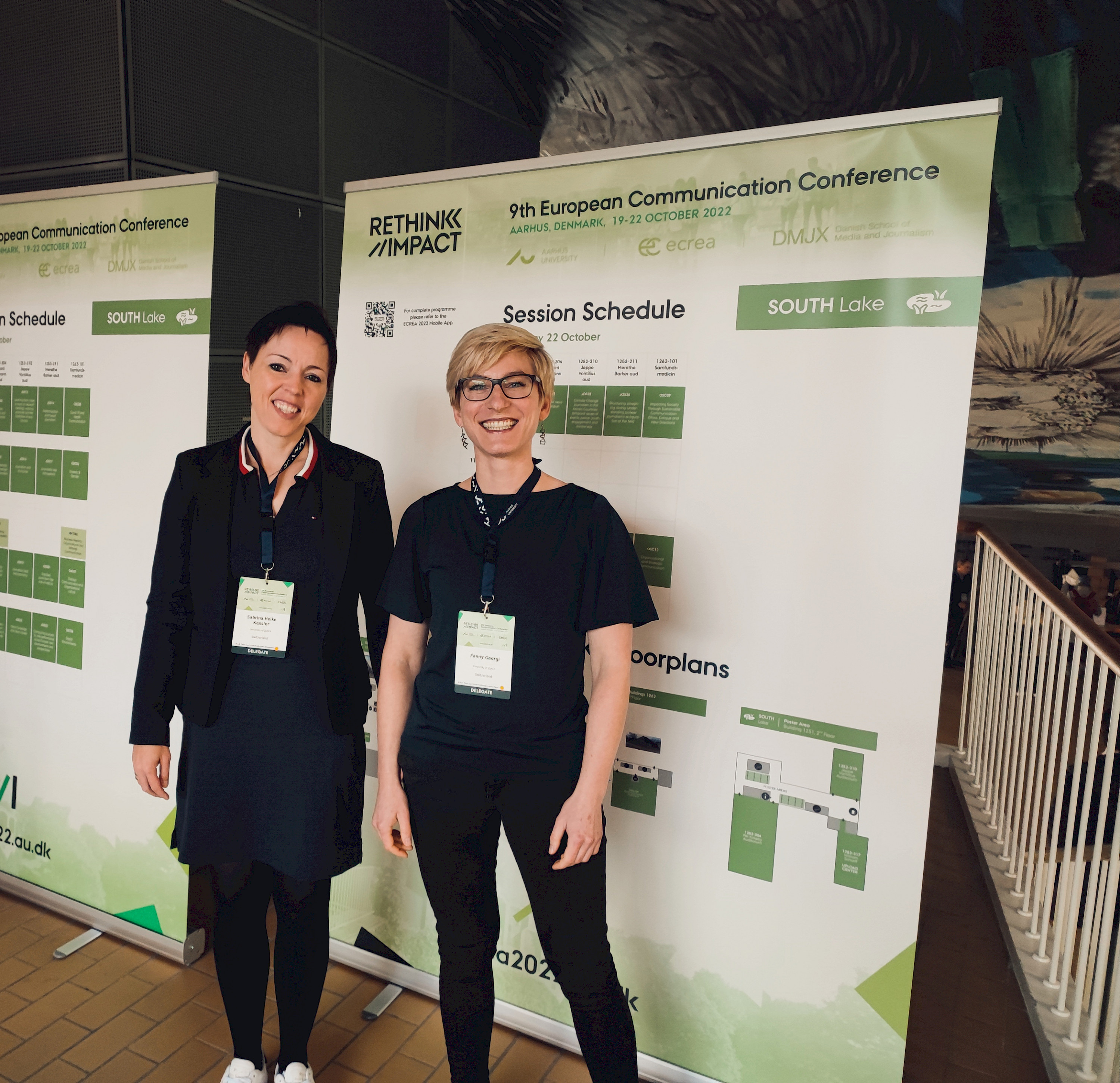
Prix Média & Newcomer 2022 Award Ceremony and Podium Discussion "Fake News and Conspiracy Theories - Learnings for the Future".
Together with the Prix Media and Prix Media Newcomer team, we organized in 2022 a panel discussion and fact-checking workshop in Zurich. The topic of the panel discussion was: "Fake News and Conspiracy Theories - Learnings for the Future". About 60 people from the general public participated.
Delphi Study
The spread of and belief in conspiracy theories and misinformation can have detrimental effects on individuals, communities, and societies, on public health, trust in science, support for authorities or for the democratic systems, and on social cohesion more generally. Against this backdrop, it is essential to
- assess the key challenges we are currently facing with regards to misinformation and conspiracy theories online,
- identify problematic developments we will encounter in the future, and
- developed strategies to effectively counteract conspiracy theories and misinformation online.
Given the complexity of these issues and the fact that a broad range of experts from different scientific disciplines, politics, tech platforms, journalism, and other fields are concerned with misinformation and conspiracy theories online, we decided to conduct a Delphi study in the project year 2022 - a technique that invites experts to assess, forecast, and evaluate certain developments. We are collaborating on this with a group of researchers at the University of Zurich.
Accordingly, we invited experts who are experienced in the field of misinformation and/or conspiracy theories, digital communication, regulation of information environments, and/or digital media literacy. We tried to integrate a broad range of perspectives, inviting scholars from different disciplines, national backgrounds, and status groups as well as practitioners from politics, legacy media, tech companies, or NGOs.
Our Delphi study was divided into three distinct phases. To fully comprehend the subject in its entirety, the first two phases were conducted with international experts. In the final phase, our focus shifted specifically to the German-speaking region, where we invited experts from the DACH region (Germany, Austria, and Switzerland) to develop targeted countermeasures against conspiracy theories and misinformation.
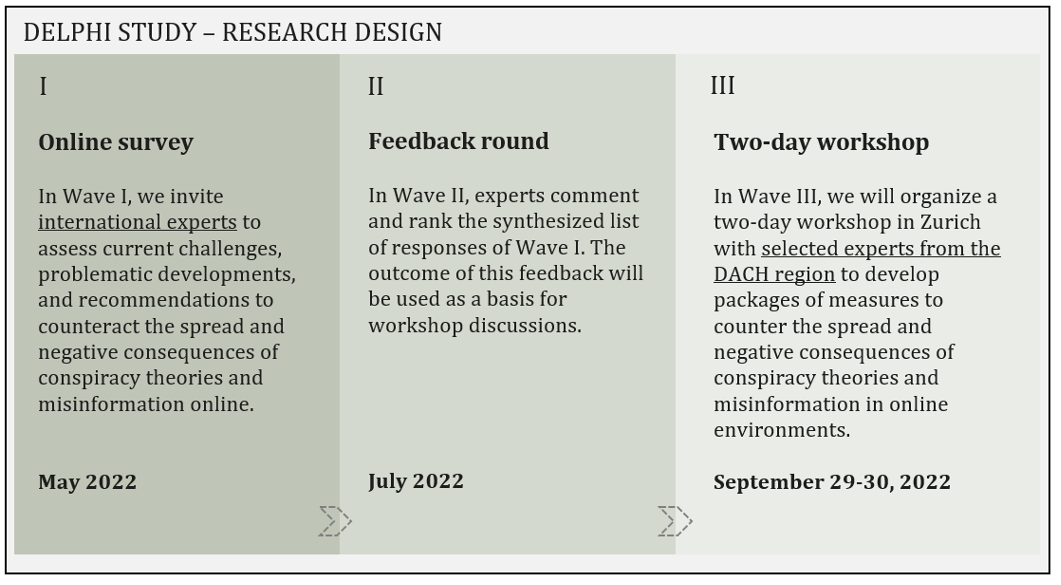
The two-day workshop was designed to facilitate in-depth discussions and further refinement of the results obtained in the earlier phases. The primary objective was to formulate comprehensive recommendations for measures aimed at combating conspiracy theories and misinformation effectively.
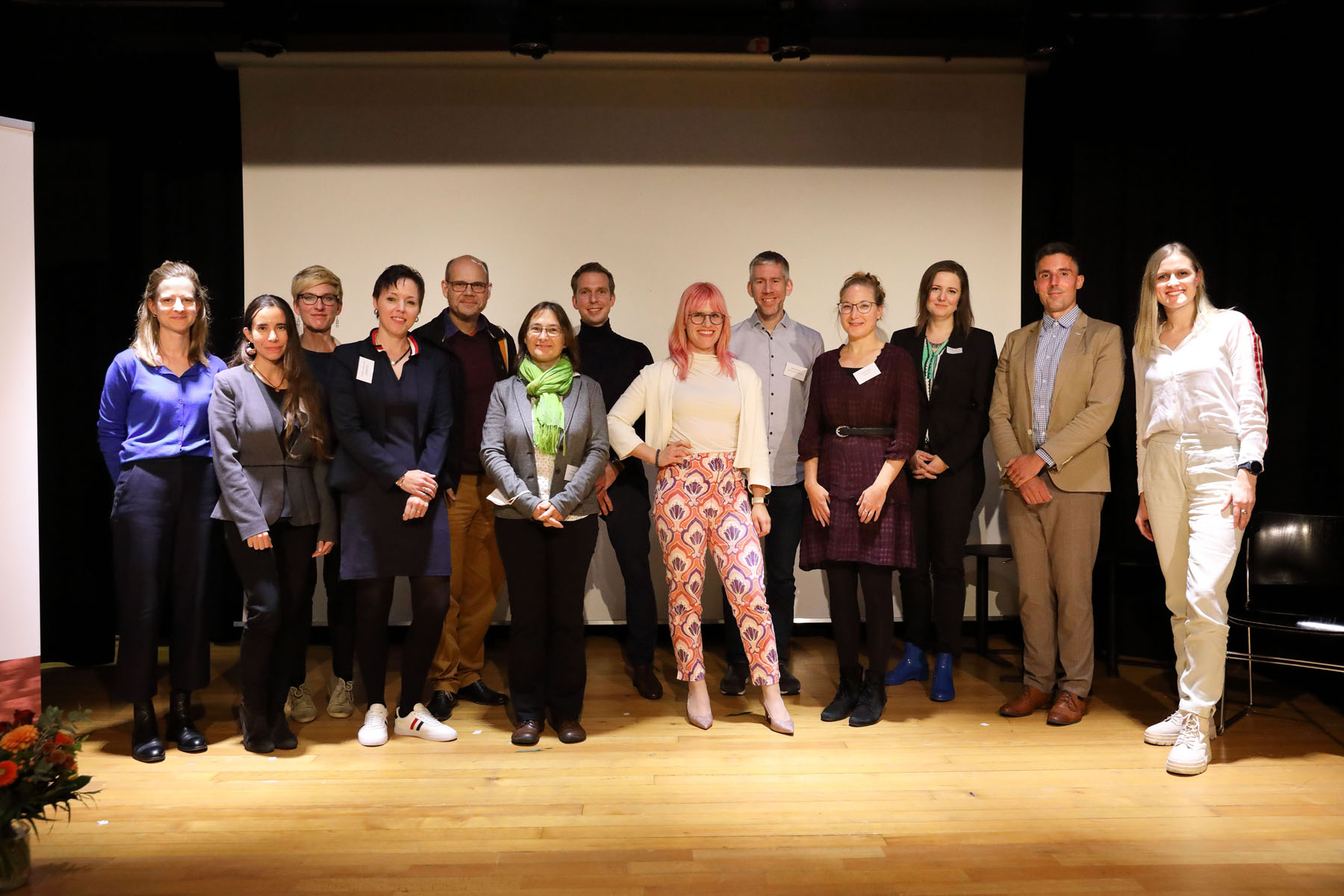
The results of the study can be summarised as follows: According to the study’s experts, many of today’s challenges will remain relevant or become even more pressing in the coming years. The experts emphasise that curbing false or misleading content and conspiracy theories on digital platforms will require a combination of individual measures and collaboration between different stakeholders and social groups. For more information see our final project handout.
The presentation of the Delphi Study results took place:
- at the Annual Conference of the International Communication Association (ICA) in Toronto (Canada), 25.-29. May 2023 under the title: "Conspiracy theories and misinformation in digital media: A Delphi study assessing current challenges, problematic developments, and potential countermeasures".
- at the Annual Conference of the German Communication Association (DGPuK) in Bremen (Germany), 18.-20. May 2023 under the title "Herausforderungen, Trends, Maßnahmen: Eine Delphi-Studie zu Verschwörungstheorien und Fehlinformation in digitalen Medien" [Challenges, trends, measures: A Delphi study on conspiracy theories and misinformation in digital media].
Final Project Handout “Countering online misinformation and conspiracy theories - Recommendations from scholars and practitioners in the DACH region (Germany, Austria, Switzerland)” published in three languages
Misinformation, half-truths, and conspiracy theories can cause considerable harm to society. They can lead people to ignore or deny scientific evidence, refuse to follow public health guidelines, marginalise certain social groups, and even legitimise violence. Therefore, it is crucial to take effective measures to counter their spread.
Researchers from the Swiss Young Academy (SYA) and the University of Zurich have decided to tackle this challenge head-on. In a three-wave Delphi study (i.e. a study in which experts assess current and future developments in multiple rounds), 47 scholars and practitioners from 13 countries were asked to identify current challenges in responding to online misinformation and conspiracy theories, to predict developments in this area, and to use these findings to develop targeted measures that respond to the challenges. The recommendations presented in this flyer are specifically aimed at the DACH region (Germany, Austria, and Switzerland) and are intended to support decision-makers in politics, technology platforms, journalism, academia, and other fields.
